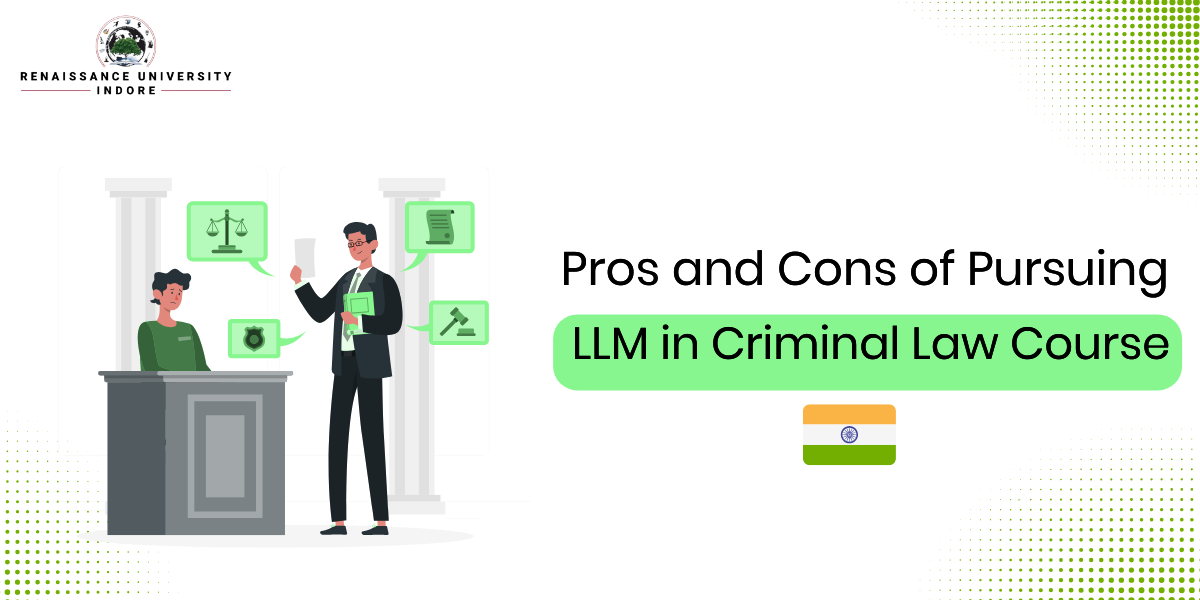Delving into the specialized field of Criminal Law through a Master of Laws (LLM) program in India is a significant decision for aspiring legal professionals. This article aims to provide a thorough examination of the Pros and Cons of Pursuing an LLM in Criminal Law Course. Tailored for law students, legal professionals, and those considering advanced legal studies, this analysis aims to offer valuable insights for making an informed decision about this specialized course.
Understanding LLM in Criminal Law:
An LLM in Criminal Law is a postgraduate program designed to provide advanced knowledge and expertise in criminal justice, procedural laws, and substantive criminal laws. This specialized course equips legal professionals to navigate complex legal scenarios and contribute meaningfully to the criminal justice system.
As of 2024, the legal landscape in India witnesses a growing demand for experts in criminal law. The increasing complexities of criminal cases and the evolving nature of legal challenges underscore the relevance of specialized education in this field.
Pros and Cons of Pursuing an LLM in Criminal Law Course
Pros of Pursuing an LLM in Criminal Law in India:
-
Expertise in Criminal Law:
An LLM in Criminal Law provides in-depth expertise, offering a nuanced understanding of criminal justice systems, procedural laws, and substantive criminal laws. This specialized knowledge enhances the ability to navigate complex criminal cases and contribute meaningfully to the legal profession.
-
Career Advancement:
Specializing in Criminal Law through an LLM can open doors to advanced career opportunities. Legal professionals with expertise in criminal law are in demand in various sectors, including litigation, academia, law enforcement, corporate compliance, and human rights advocacy.
-
Research Opportunities:
Pursuing an LLM offers the chance to engage in legal research, contributing to the development of jurisprudence in criminal law. Research opportunities may arise through academic collaborations, legal journals, and participation in conferences, allowing students to make meaningful contributions to the legal field.
-
Networking and Exposure:
The LLM program provides a platform for networking with legal experts, faculty members, and fellow students. Exposure to diverse perspectives and experiences enhances the learning process and establishes valuable professional connections, which can prove beneficial throughout one’s career.
-
Global Perspectives:
Many LLM programs in India incorporate global perspectives, exposing students to international best practices and comparative criminal law systems. This global outlook can be advantageous for legal professionals aiming to work on cross-border cases or pursue opportunities abroad, adding a unique dimension to their expertise.
-
Specialized Practice Areas:
An LLM in Criminal Law allows for specialization in specific practice areas within criminal law, such as white-collar crime, cybercrime, or human rights law. This specialization enhances the practitioner’s ability to handle complex cases and positions them as an expert in a niche field.
-
Contribution to Justice System:
Graduates with an LLM in Criminal Law are equipped to make significant contributions to the justice system. They can play key roles in legal reforms, policy-making, and advocacy, contributing to the improvement of the criminal justice system in India.
Cons of Pursuing an LLM in Criminal Law in India:
-
Specialization Limitation:
While an LLM in Criminal Law provides specialized knowledge, it may limit career options compared to a broader LLM program. Graduates may find themselves primarily focused on criminal law-related roles, which could be a disadvantage in sectors with a diverse range of legal requirements.
-
Limited Practical Exposure:
Some LLM programs may prioritize theoretical aspects over practical exposure. Practical skills are crucial in criminal law practice, and students may find the need for additional internships or practical training to bridge the gap between theory and real-world application.
-
Time and Financial Investment:
Pursuing an LLM requires a significant investment of time and finances. Individuals must weigh the benefits of specialization against the costs and consider whether the return on investment aligns with their career goals.
-
Competitive Job Market:
The legal job market in criminal law can be competitive. Graduates may need to actively seek opportunities, network effectively, and differentiate themselves to secure desired positions, especially in specialized areas of criminal law.
-
Evolution of Legal Framework:
The legal landscape is dynamic, and laws evolve over time. Specializing in criminal law may require professionals to stay updated on legislative changes and adapt their knowledge to new legal frameworks to remain effective in their practice.
-
Challenges in Niche Practice Areas:
While specialization can be an advantage, practicing in niche areas of criminal law may pose challenges. Limited opportunities, smaller client bases, and the need for constant adaptation to evolving legal trends are factors to consider when choosing a specialized practice area.
-
Research Intensity:
The research-intensive nature of an LLM program may be challenging for individuals who prefer a more practical, hands-on learning approach. Balancing theoretical coursework with the demands of legal research can be demanding.
Conclusion:
In conclusion, pursuing an LLM in Criminal Law in India is a strategic decision that demands careful consideration of personal and professional goals. The specialized knowledge, career advancement opportunities, research avenues, networking, exposure to global perspectives, specialized practice areas, contribution to the justice system, and the opportunity for deep engagement in research are significant advantages.
However, individuals must weigh these against potential limitations, such as specialization constraints, limited practical exposure, time and financial investment, a competitive job market, the evolving nature of legal frameworks, challenges in niche practice areas, and the research-intensive nature of the program.
Successful navigation of an LLM in Criminal Law requires proactive engagement, a commitment to continuous learning, and a strategic approach to career development. By considering the pros and cons outlined in this article, aspiring legal professionals can make informed decisions aligned with their aspirations in the dynamic field of criminal law in India.
Ready to Shape the Future of Criminal Law? Explore Your LLM Journey Today!”
Embark on a transformative journey in the realm of Criminal Law. Whether you’re a budding legal professional seeking specialization, an experienced practitioner aiming to elevate your expertise, or a visionary committed to contributing to the justice system, an LLM in Criminal Law could be your gateway to success. Seize the opportunity to delve into specialized practice areas, engage in impactful research, and network with legal luminaries. Take the first step towards shaping the future of criminal law in India. Explore our LLM programs, connect with our esteemed faculty, and discover how you can make a lasting impact. Your journey to excellence begins now. Enroll Now!







